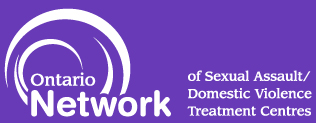In 2012, the Ontario Hospital Association, in collaboration with the Ontario Network of Sexual Assault/Domestic Violence Treatment Centres and ECHO (a former agency of the Ministry of Health), developed a number of guidelines, outlined in a document entitled Guidelines for the Treatment of Persons Who Have Been Sexually Assaulted, in order to address the gap in the continuum of care provided to victims/survivors of sexual assault. The guidelines outline the importance of a more responsive and supportive environment for victims/survivors of sexual assault who present to the Emergency Department.
To support the implementation of these guidelines, the Ontario Network of Sexual Assault/Domestic Violence Treatment Centres developed and implemented an interactive online and in-person training on sexual assault for Emergency Department staff. This project was undertaken in collaboration with Women’s College Research Institute.
- Publications
- KT Tools
- Acknowledgements
Articles
- Du Mont, J., Solomon, S., Kosa, D., & Macdonald, S. (2018). Development and evaluation of sexual assault training for emergency department staff in Ontario, Canada. Nurse Education Today, 70, 124-129. Read article.
Curricula & Guidelines
-
Macdonald, S., Du Mont, J., & Lanthier, S. (2014, May). Care and Treatment of Persons Who have Been Sexually Assaulted [Facilitator’s Guide]. Ontario Network of Sexual Assault/Domestic Violence Treatment Centres and Women’s College Research Institute- Women’s College Hospital.
-
Macdonald, S., Du Mont, J., & Lanthier, S. (2015, June). Care and treatment of persons who have been sexually assaulted [Online Curriculum]. The Ontario Network of Sexual Assault/Domestic Violence Treatment Centres and Women’s College Research Institute- Women’s College Hospital.
-
Macdonald, S., Du Mont, J., & Lanthier, S.(2014, May). Care and treatment of persons who have been sexually assaulted [PowerPoint Training]. The Ontario Network of Sexual Assault/Domestic Violence Treatment Centres and Women’s College Research Institute- Women’s College Hospital.
Funder
This project was partially funded the Ministry of Citizenship, Immigration and International Trade, Ontario Women’s Directorate, Government of Ontario.
Participating Sexual Assault/Domestic Violence Treatment Centres
- Brant Community Healthcare System, Sexual Assault/Domestic Violence Program;
- Brockville General Hospital, Assault Response & Care Centre;
- Chatham-Kent Health Alliance, Sexual Assault/Domestic Violence Treatment Centre;
- Cornwall Community Hospital, Assault and Sexual Abuse Program;
- Dryden Regional Health Centre, Sexual Assault/Domestic Violence Program;
- Lakeridge Health Oshawa, Durham Region Domestic Violence / Sexual Assault Care Centre;
- Guelph General Hospital, Guelph-Wellington Care and treatment Centre for Sexual Assault and Domestic Violence;
- Lake of the Woods District Hospital, Sexual Assault/Partner Abuse and Safekids Programs;
- Kingston General Hospital, Sexual Assault/Domestic Violence Program;
- Perth & Smith Falls District Hospital, Lanark County Sexual Assault/Domestic Violence Program;
- St. Joseph’s Health Care, London, Sexual Assault / Domestic Violence Treatment Centre;
- Trillium Health Centre and Credit Valley Hospital, Sexual Assault and Domestic Violence Services;
- North Bay General Hospital, Sexual Assault and Domestic Violence Treatment Program;
- Headwaters Health Care Centre, Domestic And Sexual Assault Treatment Program;
- The Ottawa Hospital, Sexual Assault & Partner Abuse Care Program (SAPACP)/Programme De Soins Aux Victimes D’Agression Sexuelle Et D’abus Par Un Partenaire;
- Grey Bruce Health Services, Sexual Assault & Partner Abuse Care Centre;
- Peterborough Regional Health Centre, Sexual Assault/Domestic Violence Program;
- Renfrew Victoria Hospital, Renfrew Victoria Hospital Regional Assault Care Program;
- Sault Area Hospitals, Sexual Assault/Partner Assault Clinic;
- The Scarborough Hospital, Sexual Assault/Domestic Violence Care Centre;
- Niagara Health System, Sexual Assault /Domestic Violence Treatment Program;
- Sudbury Regional Hospital, Violence Intervention and Prevention Program;
- Thunder Bay Regional Health Sciences Centre, Sexual Assault/Domestic Violence Treatment Centre;
- Women’s College Hospital, Sexual Assault/Domestic Violence Care Centre;
- Quinte Health Care, Domestic Violence/Sexual Assault Response Program; and
- Windsor Regional Hospital, Sexual Assault / Domestic Violence & Safekids Care Centre; York Central Hospital, Domestic Abuse & Sexual Assault (DASA) Care Centre of York Region.
Research Team
- Co-Principal Investigator: Janice Du Mont, Women’s College Research Institute- Women’s College Hospital;
- Co-Principal Investigator: Sheila Macdonald, Ontario Network of Sexual Assault/Domestic Violence Treatment Centres;
- Curriculum developer: Stephanie Lanthier, Women’s College Research Institute- Women’s College Hospital;
- Project Coordinator: Lindsay Holder, Ontario Network of Sexual Assault/Domestic Violence Treatment Centres, Women’s College Research Institute- Women’s College Hospital; and
- Project Coordinator: Shannon Elliot, Ontario Network of Sexual Assault/Domestic Violence Treatment Centres, Women’s College Research Institute- Women’s College Hospital.
Collaborators
Advisory Committee
- Kathleen Fitzgerald, Sexual Assault/Partner Abuse Program, Kenora;
- Nancy Horan, Domestic Violence/Sexual Assault Treatment Program, Sudbury;
- Jennifer Keeler, Peel Region Sexual Assault/Domestic Violence Program, Mississauga;
- Tara Leach, Sexual Assault Partner Abuse Care Program, Ottawa;
- Kari Sampsel, Sexual Assault Partner Abuse Care Program, Ottawa;
- Diana Tikasz, Sexual Assault/Domestic Violence Care Centre, Hamilton; and
- Jennifer Valiquette, Renfrew Victoria Hospital Regional Assault Care Program, Renfrew.
